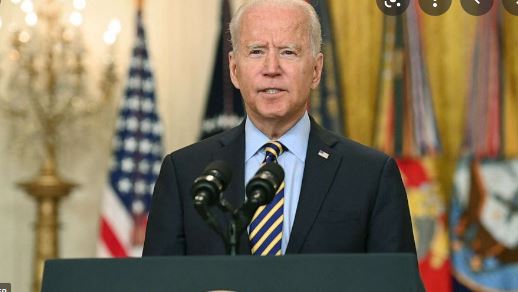President Joe Biden, in a speech Tuesday in Atlanta, called for changing Senate rules in order to pass voting rights protections, going further than he has before in an effort to unify Senate Democrats around what he frames as an existential issue for the country.
Biden, whose support for the legislative filibuster has softened in recent months, endorsed changing the rule that allows the minority party to block any bill that doesn’t garner 60 votes.
Lamenting that the Senate where he served 36 years “has been rendered a shell of its former self,” Biden said that if Republicans continue to block debate on two voting rights bills, “we have no option but to change the Senate rules … whichever way they need to be changed.”
“The threat to our democracy is so grave that we must find a way to pass these voting rights bills,” he said.
The evenly divided Senate, which Democrats control based on Vice President Kamala Harris‘ ability to cast a tie-breaking 51st vote, is poised this week to consider two Democratic measures, previously blocked in the chamber, that aim to defang many of the new voting laws in GOP-led states.
“The next few days, when these bills come to a vote, will mark a turning point in this nation,” Biden said during a speech on the campus of Morehouse College. “Will we choose democracy over autocracy, light overshadow, justice over injustice? I know where I stand. I will not yield. I will not flinch. I will defend your right to vote and our democracy against all enemies foreign and domestic. And so the question is where will the institution of United States Senate stand?”
Voting, Biden said, “is threshold liberty. Without it nothing is possible. With it, anything is possible.” Referring several times to “the defeated former president” and his attempt to overturn the 2020 election, Biden blasted Republicans in Georgia and other states for imposing new voting restrictions.
Harris, speaking ahead of Biden, invoked Martin Luther King Jr.‘s words from decades ago, warning against complacency and acceptance in the face of partisan voting restrictions. “Anti-voter laws are not new in our nation, but we must not be deceived into thinking they are normal,” she said. “We must not be deceived into thinking a law that makes it more difficult for students to vote is normal.”
Republican senators, she continued, have “exploited arcane rules to block these (Democratic voting) bills,” rebutting GOP claims of precedent around the filibuster by asserting that “nowhere does the Constitution give a minority the right to unilaterally block legislation.”
“The Senate must act,” she continued. “We cannot tell (future generations) that we let a Senate rule stand in the way of our most fundamental freedom.”
The speeches are the sort of energetic, full-throated push for action on the issue of voting rights that many activists have been waiting for since Biden was inaugurated. Several, dismayed that the president until now prioritized a bipartisan infrastructure law and a now-stalled effort to enhance the social safety net over voting rights, opted not to attend the speech and made clear they won’t be satisfied with more words, only action by the Senate.
“It sets a serious precedent that at the end of the day, when there are people that are coming after your base of voters, right, and you’re stringing it out, and you’re not reacting,” LaTosha Brown, a Georgia-based advocate and co-founder of Black Voters Matter, said on a call with reporters Monday.
“We don’t need another speech. What we need is actually a plan,” said Cliff Albright, executive director of the Black Voters Matter Fund, who said it’s long past time Biden puts the weight of the presidency behind a push to change the filibuster rule.
Martin Luther King III, the son of the iconic civil rights leader, met with Biden and Harris on Tuesday, and said in an earlier statement that he understood the frustration of activists choosing not to attend but remained hopeful a push by the White House on voting rights could lead to action.
“We’ve seen what’s possible when President Biden uses the full weight of his office to deliver for bridges, and now we need to see him do the same for voting rights,” King said.
Although Biden’s gradual shift on the filibuster reflects the new consensus among Senate Democrats, he still doesn’t have the necessary votes. Changing the rule itself in order to pass voting rights legislation requires the support of all 50 Democratic senators. At least two of them, Sens. Joe Manchin III of West Virginia and Kyrsten Sinema of Arizona have both said they oppose the change.
Thus far, Manchin has shown himself to be impervious to pressure from the White House, if not downright prickly about it. Just before Christmas, upset that the White House had issued a statement citing his opposition to a major piece of its legislative agenda as a primary reason a vote on the bill was being delayed, he blindsided Biden by going on television to announce he opposed the president’s $1.8 trillion “Build Back Better” proposal, a package of tax credits and benefits for working families.
The setback for Biden’s social spending bill, his administration’s focus in the final months of 2021, explains at least in part why the White House is shifting voting rights to the front burner. But, legislatively, altering the filibuster rule is an even heavier political lift than Build Back Better, which Democrats had hoped to pass with 50 votes through the process of budget reconciliation.
It isn’t clear how Biden’s utilization of the presidential bully pulpit in Atlanta on Tuesday will change Manchin’s view on the filibuster. White House press secretary Jen Psaki acknowledged Monday that Biden’s ability to secure votes for his agenda in Congress, a big part of his pitch for the presidency in 2020, is no guarantee: “What we’re talking about is whether we can get enough votes in Congress to get this done,” she said.
Manchin has tried to win Republican backing for a compromise voting rights proposal, so far without success.
Meanwhile, Democrats are set to consider two bills that have already been approved by the House. The Freedom to Vote Act would defang state-led efforts to restrict mail-in or absentee voting, would make Election Day a holiday,and halt partisan gerrymandering that has drawn congressional districts in a way that dilutes the votes of minority communities. The John R. Lewis Voting Rights Advancement Act would restore anti-discrimination components of the 1965 Voting Rights Act that the Supreme Court’s conservative majority, arguing that voting rights were now firmly guaranteed, struck down in 2013.
Biden placed the current fight for voting rights on a historical continuum, framing it as the new battle in an ongoing fight for civil rights and necessary response to former President Donald Trump‘s lies suggesting the 2020 election that he lost was fraudulent – which incited the Jan. 6, 2021, Capitol insurrection and has served as the pretext for the new Republican state laws curtailing voting access.
Before delivering remarks, Biden and Harris, who rarely travel together outside Washington, visited the crypt of the Rev. King and his wife, Coretta Scott King. They also stopped at the historic Ebenezer Baptist Church, where both Martin Luther King Jr. and the late Democratic Rep. John Lewis, the civil rights hero and Georgia congressman, were eulogized. Upon entering, Biden lowered his face mask to offer a message to voting rights activists: “Keep the faith.”
Accompanying them is Sen. Raphael Warnock, Georgia’s first Black senator, whose election in one of two runoffs there last January delivered Democrats their 50-seat majority. Warnock, who must run for reelection to a full six-year term in November, is a top target for Republicans and dependent on high turnout from Black voters.
In 2020, Biden won Georgia by just 11,779 votes, a margin that held despite Trump’s effort to pressure the state’s top election official, Secretary of State Brad Raffensperger, to overturn the result. Raffensperger, a Republican, held firm in the face of Trump’s false claims of voter fraud after an increase in mail voting.
But after Biden assumed the presidency, Georgia lawmakers passed one of the country’s strictest new laws curtailing voting rights: making absentee voting more complicated, limiting the availability of ballot drop boxes, even making it a crime to distribute water to people waiting in line outside polling places.
On Tuesday, Raffensperger held a news conference to criticize Biden and Democrats for what he called “an attempt to weaken election security under the guise of voting rights.”












